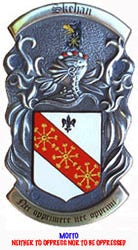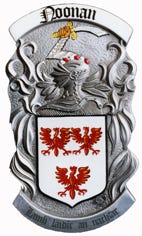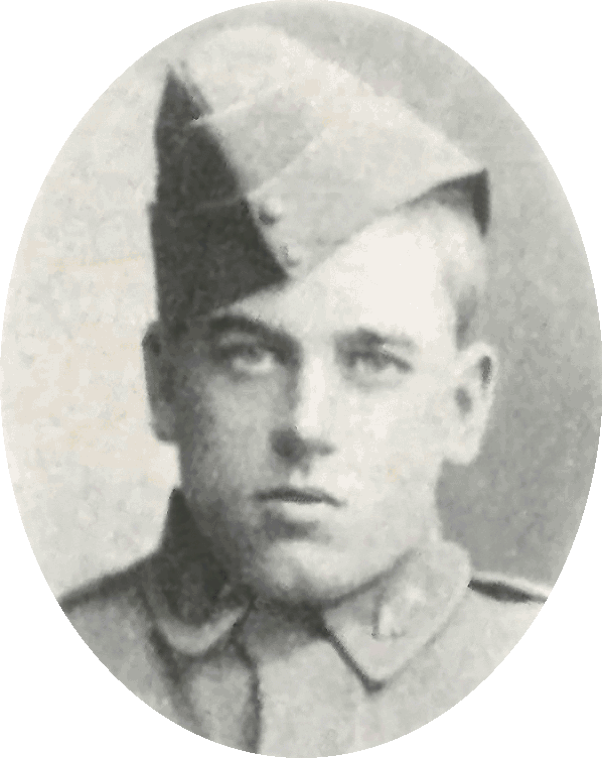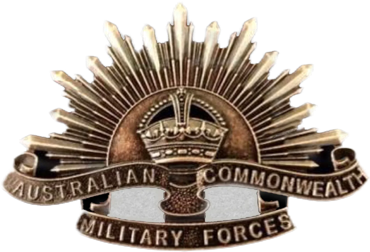
THE SKEHAN FAMILY
of Kilmre Victoria.




1424. Pte. PATRICK RAYMOND SKEHAN1.
Ray was born at Kilmore on April 27, 1894, the 2nd son of Patrick and Amy Skehan.
Educated at Assumption College, Kilmore. He enlisted in the AIF at Broadmeadows on November 7, 1914, and sailed from Australia with the 2nd reinforcement to the 7th Battalion on February 1, 1915. On April 5, 1915, he embarked to join M.E.F. Gallipoli and took part in the landing on Gallipoli on April 25, 1915. In July, he was buried in a SAP2, which was blown in by heavy shellfire from the German Warship “Goeben”.
Only two were recovered alive due to their proximity to the main trench. He regained consciousness en route to Malta, where he was admitted to St. Andrews Hospital with shell shock and suffered semi-paralyses for some time.
After Gallipoli, he was transferred to the 1st Pioneer Battalion and sent to France.
The following is a brief extract from his writings:
AWARDED THE MILITARY MEDAL;
The citation reads;
He returned to Australia on the “City of Exeter” and was discharged on June 12, 1919. Due to his war service injuries, suitable work was difficult to obtain. He worked as a casual labourer with the railways, was appointed librarian in charge of the musical records at Mildura University until its closure, returned to Moonee Ponds, and finished his working life at the Maribynong ordnance factory. Blessed with a rich bass voice, he often sang in operatic choruses and in St . Theresa’s choir, Essendon.
He passed away on July 4, 1972, aged 78 years, and is buried in the Kilmore Catholic Cemetery.
IN THE TRENCHES,
On May 9th, 1930, Patrick (Ray) Skehan wrote the following account of his time in the trenches during WWI, during which he was wounded on multiple occasions.
I was discharged on 12/6/1919 suffering from nervous troubles, heart trouble, post influenza debility and G.S.W. Left knee. I slept poorly, and just as I was falling off to asleep I used to jump. A peculiarity was, that I was fearful of any officials, say for instance my employers, and tremble when they appeared, although I knew my work was quite alright. I was self-conscious to a painful degree and worried over it, because before the war I had an abundance of confidence. On any excitement my heart beat so violently that it appeared to be choking, and I went pail or rather pallid. The above briefly describes my condition when I first came home, and it has persisted right up to the present time. I treated myself with tonies and nerve medication whenever I could procure them, because I was only casually employed as a labourer.”
Extract of a letter from his father. Dated 18/5/1930;
sic “He left here with the 2nd reinforcement to 7th Battalion, and took part in the landing on Gallipoli in 1915. He was severely wounded in July of that year by a 6” shell explosion. After some months at Malta he was transferred to the 1st Pioneer Battalion and went to France. He was again seriously wounded at Pozieres, this time with shrapnel in the knee and leg. After recuperating in England for 3 to 4 months he returned to the fighting line and was in it all to the 11th November, 1918, when he was sent to Hospital with Pneumonic-Influenza. He returned from active service in March 1919, when I noticed a great change in him. His nerves seemed to be completely shattered.”
1 Note: Pte. Skehan’s birth certificate reads Raymond Patrick Skehan. However, his Baptism Certificate reads Patrick Raymond. Within the family, he was always called Ray; outside the family circle, he was called Pat or Patrick, as seen in his military records.
